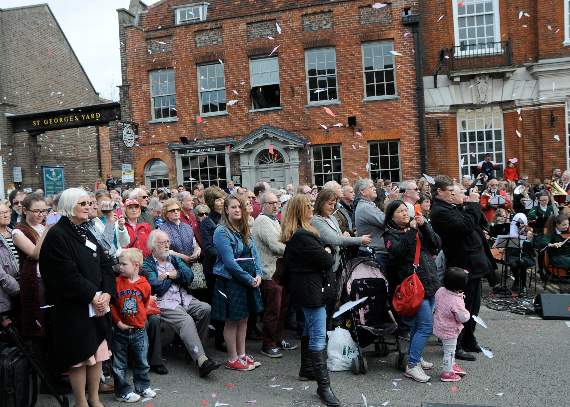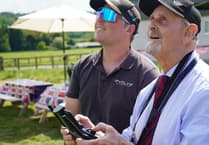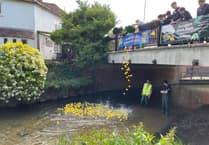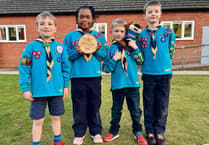ON May 10, 1916, amid the increasing destruction of the First World War, Farnham paused for two minutes of silence “as a token of respect to the memory of those who have fallen in the war, to the wounded, to the prisoners and to those who are fighting for their country”.
This monumental occasion was, according to research by the Museum of Farnham, the first of its kind in the world and later gave rise to the international symbol of honour and remembrance observed every Armistice Day since 1919.
On Sunday, almost 100 years later, the people of Farnham again gathered on the same spot in Castle Street for ‘Time to Remember’ - a one-off event organised by the Farnham Maltings and Farnham Town Council modelled on the original event in 1916.
The day began at with a procession led by marching bands of the Princess of Wales’s Royal Regiment and Farnham Sea Cadets from Farnham Castle to the bottom of Castle Street, where a poignant ceremony was held to remember the fallen.
This included the performance of an original piece of music composed by Ben Mason and arranged by Chris Fogg, taken from poems, songs and writings by William Wordsworth, Marjorie Pickthall, the Psalms, Edwards Shanks, JM Barrie, Wilfred Owen, Edward Thomas and Laurence Binyon each with a special connection to Farnham.
Addressing the large crowd dressed in a Red Cross nurse’s uniform similar to the one worn by her grandmother during the Great War, the president of the British Red Cross Surrey branch, Lucinda Fleming said: “100 years ago this month, on a Sunday morning just like this one, crowds gathered here in Castle Street for the annual Farnham fair.
“Mrs Anderson, commandant of Waverley Abbey Military Hospital, officially opened the fair to raise much-needed funds for the Red Cross and said: ‘At the height of these, the worst days of the First World War in 1916, we should do all that we can to help those brave fellows who are risking their lives for king and country and for us’.
“After this the crowd stood in respectful silence for two minutes, believed to be the first ever such ceremony to be held in England - indeed the first such ceremony to be held anywhere in the world.
“100 years on from when that first silence was held, we have assembled here once again to remember, honour and give thanks to all those then and since who have risked their lives so that we may enjoy yet another spring morning like today.”
Mrs Fleming was joined on stage by Colour Sergeant Josese Tunidau of second battalion PWRR, a Farnham-based soldier of Fijian birth who joined the British Army 15 years ago and was awarded a special mention in dispatches following his tour of duty in Iraq.
Mr Tunidau said: “The silence for me represents an opportunity for all of us, regardless of where we come from, however old or young we may be, whatever race or religion we are, to stand together in remembrance of those who made the ultimate sacrifice defending the freedoms we enjoy today and reflect upon the human cost of conflict everywhere.
“I am amazed to be speaking at this event this morning, representing myself, my regiment and the commonwealth.”
Other speakers included the Mayor of Farnham, Pat Frost, former Bishop of St Albans and vicar of St Thomas-on-the Bourne Right Reverend Dr Christopher Herbert, Corporal Richard Frizzell and Corporal Nick Bryan of third battalion PWRR, and farmer Angus Stovold who explained how his great uncle’s mare Beauty was sent to France just one day after appearing at the 1916 Farnham agricultural fair and never returned.
Another moving moment came courtesy of nine-year-old William Cobbett School pupil Evan Wilkie who recounted to the crowd the story of his great grandfather’s experience as a prisoner of war during the Second World War.
“My great granddad did manage to escape,” said the young schoolboy with an unwavering tone. “He stole a bicycle and made his way across Germany in secret until he met a convoy of tanks. These tanks turned out to be approaching American forces, and so he was safe.
“I have a bike. It’s blue and silver, and I like to ride it all over Elstead, Alice Holt and Waverley Abbey. Because of people like my great granddad, I can.”
Towards the end of the ceremony Dr Annette Kratt, a member of the Farnham and Andernach Twinning Association, read the Kohima Epitaph in German translated by Evan - ending with the evocative words “we will remember them”.
This was followed by a rendition of The Last Post on bugle and an impeccably observed two-minute silence culminating with the bells of St Andrew’s Church bringing the poignant occasion to a close.
A traditional May Day fair was later held in Gostrey Meadow offering steam-powered fairground rides, stalls, special displays including the Museum of Farnham’s current exhibition on the history of the two-minute silence, historical re-enactments, a petting farm, May pole dancing, more music and light refreshments provided by co-operative Farnham Country Market.





Comments
This article has no comments yet. Be the first to leave a comment.